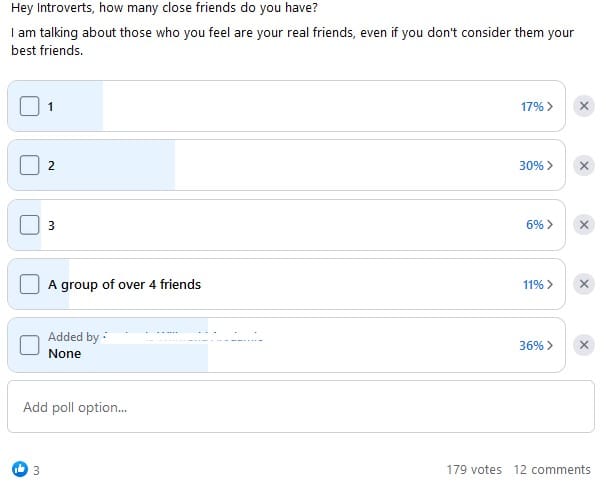When you think of introverts, what comes to mind? Is it the image of someone who spends most of their time alone, avoiding social interactions? Or perhaps you believe that introverts are simply loners who have no interest in forming meaningful friendships?
Well, the truth is much more complex. Contrary to popular belief, introverts do have friends. In fact, they value their social relationships deeply, despite their natural inclination towards solitude and introspection. However, introverts maintain a small circle of people whom they can be real with, preferably 2-3 people at most. So yes, 90% introverts have at least 2-3 friends.

So, what does it really mean to be an introvert and have friends? Let’s explore the intricacies of introversion and social relationships, and uncover the myths and realities behind this often misunderstood personality type.
Key Takeaways:
- Introverts may have a fewer number of friends but value quality over quantity in their social relationships.
- Introverts recharge their energy through alone time and introspection.
- Building friendships as an introvert often involves small and meaningful conversations.
- Introverts maintain friendships through deep connections and meaningful interactions.
- Understanding and embracing introverted identity is crucial for introverts to navigate social situations effectively.
Understanding Introversion and Socialization
Introverts have unique traits and preferences when it comes to socializing. Unlike extroverts who thrive in social settings, introverts are energized by solitude and prefer deep connections over small talk. Understanding the inner world of introverts can shed light on how they develop social skills and maintain meaningful friendships.
“I find small talk draining and prefer to have conversations that delve deeper into topics that truly interest me. It’s not that I dislike people or socializing, it’s just that I value quality over quantity in my social interactions.” – Most inrtoverts
Introverts usually have a rich inner world and enjoy spending time alone to recharge their energy. Hobbies and solitary activities are often essential to their well-being. Engaging in activities such as reading, writing, painting, or gardening allows introverts to explore their interests and foster self-reflection.
While introverts may be perceived as shy or anti-social, they do possess social skills that enable them to connect with others in a meaningful way. These skills may differ from the more extroverted approach, but they are nevertheless valuable and effective.
Developing Social Skills
Even though introverts may prefer alone time, they understand the importance of social skills in navigating the world. They recognize that certain social settings require strong communication abilities and the ability to establish connections. Introverts often develop excellent listening skills, empathy, and the ability to observe and understand non-verbal cues.
Finbar, an introvert, shares his experience:
“I’ve always been more comfortable observing others and picking up on subtle cues rather than actively participating in group conversations. This has allowed me to develop a keen sense of empathy and understanding of others’ emotions.”
Introverts also excel in one-on-one conversations where they can engage in deep discussions about their passions and interests. They value the depth and thoughtfulness that comes with such conversations.
Maintaining Friendships
Introverts may have fewer friends compared to extroverts, but the friendships they cultivate are often deep and meaningful. They prioritize quality over quantity and invest their energy in nurturing close relationships.
“I have a small circle of close friends who truly understand and appreciate me. We may not see each other every day or engage in constant communication, but when we do connect, it’s always meaningful and fulfilling.”
Social media can also play a role in maintaining friendships for introverts. While they may not be as inclined to post frequent updates or share every aspect of their lives online, platforms like Facebook or Instagram allow introverts to stay connected and engage in meaningful conversations with their close friends.
Overall, introverts possess social skills and maintain friendships that are unique to their introverted nature. While they may navigate social interactions differently from extroverts, their ability to engage in deep conversations, appreciate solitude, and foster genuine connections is what makes their relationships fulfilling and meaningful.
Navigating Social Interactions
As an introvert, social interactions may sometimes feel overwhelming. However, with a few practical tips and strategies, you can navigate these situations with ease and confidence. Understanding social interaction dynamics, body language cues, managing social plans, and embracing your unique introverted qualities can help you thrive in social settings.
Body Language and Social Interaction
Body language plays a crucial role in social interactions. By paying attention to non-verbal cues, you can better understand others and effectively communicate your own thoughts and feelings. Here are some key body language tips for introverts:
- Practice active listening by maintaining eye contact, nodding, and using affirmations to show interest and engagement.
- Use open and welcoming body language, such as uncrossing your arms and facing towards the person you’re speaking with.
- Take note of others’ body language to gauge their level of interest or comfort in the conversation. Adjust your approach accordingly.
Remember, body language is a powerful tool for building connections and conveying your thoughts and emotions in social interactions.
Managing Social Plans
As an introvert, it’s important to manage your social plans in a way that aligns with your energy levels and preferences. Here are some strategies to help you navigate social plans:
- Plan ahead: Take the time to consider your commitments and prioritize social activities that align with your interests and values.
- Schedule downtime: Allow yourself ample time for solitude and reflection to recharge your energy before and after social events.
- Set boundaries: Communicate your needs to others and don’t be afraid to decline invitations or suggest alternative, more comfortable social settings.
- Be selective: Choose quality over quantity when it comes to socializing. Focus on forming deep connections with a few close friends rather than spreading yourself too thin.
By managing your social plans in a way that respects your introverted nature, you can maintain a healthy balance and enjoy meaningful social interactions.
Embracing Your Introverted Qualities
The extroverted world may often value outgoing and sociable behavior, but as an introvert, you have unique strengths and qualities to offer in social interactions. Embrace your introversion by:
- Being an active listener: Your thoughtful and attentive nature allows you to truly understand and empathize with others, making you a valuable confidant.
- Engaging in deep conversations: Introverts thrive in one-on-one or small group settings where meaningful discussions can take place. Explore topics that truly interest you and allow for intellectual and emotional connection.
- Bringing your unique perspective: Introverts often have a rich inner world and insightful observations. Share your thoughts and ideas, as they can contribute to valuable insights and discussions.
By embracing your introverted qualities, you can approach social interactions with confidence and authenticity.
| Benefits of Navigating Social Interactions as an Introvert | Illustration |
|---|---|
| Developing genuine connections | Non-verbal cues displaying interest and empathy |
| Staying true to your energy levels | Managing social plans to avoid exhaustion |
| Cultivating deep and meaningful friendships | Engaging in thought-provoking conversations |

“Understanding body language and managing social plans are essential skills for introverts to navigate social interactions effectively.”
Building Friendships as an Introvert
As an introvert, you may find it challenging to build new friendships and expand your social circle. However, this doesn’t mean it’s impossible for you to connect with new people and find meaningful relationships. In fact, introverts often excel at cultivating deep and genuine friendships through their preference for small, intimate conversations.
One effective strategy for building friendships as an introvert is to join a book club or similar interest-based groups. By engaging in discussions centered around topics that genuinely interest you, you’ll have the opportunity to connect with like-minded individuals who share your passion for reading or a specific subject. Book clubs provide a structured and comfortable environment for introverts to engage in meaningful conversations while exploring their interests.
Joining a book club not only allows you to meet new people but also provides a common ground for initial conversations. You can start by discussing your favorite books, sharing recommendations, or even debating different literary themes. These interactions often lead to deeper connections and the potential for long-lasting friendships.
Example: Imagine yourself joining a book club dedicated to science fiction novels. You attend the first meeting and find yourself engaged in a passionate discussion about the latest dystopian bestseller. As you express your thoughts and listen to others’ perspectives, you realize that you’ve found a group of individuals who share your love for imaginative storytelling. Over time, you develop strong bonds with your fellow book club members, going beyond discussing books and engaging in other social activities.
Aside from book clubs, there are numerous other avenues for introverts to meet new people and expand their social circles. These include attending lectures or workshops focused on a particular interest, volunteering for a cause that resonates with you, or participating in hobby-based classes. The key is to choose activities that align with your passions and allow you to engage in meaningful conversations with others who share those interests.
Remember, building friendships as an introvert may take time and effort, but the connections you form are often deep and fulfilling. By focusing on quality over quantity and engaging in activities that align with your interests, you’re more likely to find like-minded individuals who appreciate your unique qualities.
| Strategies for Building Friendships as an Introvert |
|---|
| Joining book clubs or interest-based groups |
| Attending lectures or workshops related to your passions |
| Volunteering for causes that resonate with you |
| Participating in hobby-based classes |
Maintaining Friendships as an Introvert
As an introvert, your social relationships are important to you, and you value having close friends who understand and appreciate your need for solitude. Maintaining these friendships can sometimes be challenging, but with the right approach, you can nurture and sustain meaningful connections.
Social media can play a role in maintaining friendships for introverts. While some introverts may prefer face-to-face interactions, social media platforms can provide a convenient and comfortable way to stay connected with friends. You can use platforms like Facebook, Instagram, or Twitter to share updates, photos, and engage in conversations with your close friends. However, it’s important to remember that social media should complement real-life interactions, rather than replace them entirely.
An example:
You and your close friend, Sarah, both love hiking. You recently went on a memorable hike together, and you want to share your experience with her. You can post a photo on Instagram with a caption that captures the beauty of the hike, tagging Sarah and mentioning how much you enjoyed exploring nature with her. This small gesture can help maintain your friendship and keep the conversation going.
While social media can be a useful tool, introverts also prioritize quality over quantity in their social relationships. Meaningful conversation and deep connections are essential to introverts’ well-being. Instead of engaging in superficial small talk, introverts thrive in conversations that delve into deeper topics of interest.
An example:
You meet up with your friend, Mark, for a coffee. Instead of talking about the weather or the latest celebrity gossip, you discuss a thought-provoking book you both recently read. This conversation allows you to connect on a deeper level, sharing your thoughts and insights, and strengthening your friendship.
To maintain your friendships as an introvert, focus on creating opportunities for meaningful conversations and engaging in activities that align with your interests. Look for shared hobbies or join communities that cater to your passions. By surrounding yourself with like-minded individuals, you can cultivate friendships based on common interests and engage in conversations that go beyond surface-level interactions.
- Social media can be a valuable tool for introverts to maintain friendships.
- Introverts prioritize quality over quantity in their social relationships.
- Meaningful conversation is essential for introverts to sustain friendships.
- Cultivating shared hobbies and interests can foster deeper connections.
Remember, as an introvert, maintaining friendships is about finding a balance between your need for solitude and the value of meaningful connections. By embracing your introverted nature and investing in relationships that resonate with you, you can create a supportive social circle that brings joy and fulfillment to your life.

The Importance of Alone Time
As an introvert, solitude is essential for your well-being. It provides you with the opportunity to recharge and reflect in your own company, away from the demands of the outside world. Spending enough time alone allows you to fully engage with your own thoughts and emotions, deepening your self-awareness and cultivating a strong sense of self.
“In solitude, you find yourself. You can immerse yourself in your passion projects, explore your own interests, and fully embrace your introverted nature without any external distractions”
Having sufficient alone time enables introverts to tap into their creativity and inner resources. It is during these moments of solitude that ideas flourish and inspiration strikes. Your thoughts and insights are given the space they need to mature and form into something meaningful.
Imagine a day when you have no appointments, deadlines, or social obligations. You wake up, make yourself a cup of hot coffee, and settle into your favorite armchair. With a sense of calm and contentment, you dive into a novel that has been gathering dust on your bookshelf. The words on the pages transport you to a different world, igniting your imagination. Your mind wanders freely, connecting dots and unraveling complex ideas. This uninterrupted time alone allows you to explore the depths of your thoughts, discovering new perspectives and insights along the way.
Alone time has a transformative power that cannot be understated. It helps introverts maintain a healthy balance between their internal and external worlds. Without it, the demands of socializing and constant stimulation can be overwhelming and draining.
The Benefits of Alone Time for Introverts
- Recharging your energy levels and preserving your mental well-being.
- Reflecting on your experiences and personal growth.
- Nurturing your creativity and cultivating new ideas.
- Processing emotions and gaining clarity.
- Exploring your passions and interests at your own pace.
| Time Spent Alone | Benefits for Introverts |
|---|---|
| Early morning solitude | Clearing your mind, setting intentions for the day ahead |
| Daytime alone time | Productive work, deep thinking, and uninterrupted focus |
| Evening solitude | Unwinding, relaxing, and reconnecting with yourself |
Finding Balance
While alone time is crucial for introverts, it’s essential to strike a balance between solitude and social interactions. Building meaningful relationships and participating in social activities are important aspects of life. By understanding your needs and setting boundaries, you can create a harmonious balance that allows you to fully embrace your introverted nature while still engaging with the world.
Coping with Loneliness
Contrary to popular belief, introverts are not necessarily lonely individuals. While they may appear to be more reserved and less socially outgoing than extroverts, introverts find solace in deep and meaningful connections with real friends. Loneliness is not defined by the number of friends one has, but rather by the quality and closeness of those relationships.
Introverts prioritize close relationships, valuing quality over quantity. They seek authentic connections with individuals who truly understand and appreciate them. These real friends provide a sense of companionship, support, and understanding that combats any feelings of loneliness.
“I used to believe that being introverted meant I would always feel lonely, but I’ve come to realize that it’s about finding the right people to connect with on a deeper level. My close friendships bring me immense joy, and I feel truly understood and accepted.”
The Power of Real Friends
Real friends play a vital role in an introvert’s life. Their close relationships provide a safe space for introverts to be their authentic selves, free from judgment or social expectations. These friendships are built on trust, mutual respect, and genuine empathy, creating a strong foundation for support and meaningful connection.
Real friends understand and respect an introvert’s need for solitude and alone time. They appreciate that introverts may require time to recharge their energy and process their thoughts and emotions. These friends offer unwavering support and patience, never pushing introverts into uncomfortable social situations.

Cultivating Close Relationships
Introverts cultivate close relationships through meaningful conversations and shared experiences. They engage in deep discussions about their passions, interests, and emotions, connecting on a profound level. These conversations allow introverts to express themselves fully, fostering a sense of belonging and understanding.
Introverts often develop close relationships within smaller social circles, where they can establish a sense of intimacy and trust. They may prefer to spend time with a few close friends rather than attending large social gatherings. These intimate settings provide the opportunity for authentic connection and genuine bonding.
The Value of Quality Over Quantity
While introverts may not have an extensive network of friends, they prioritize the quality of their relationships above all else. Genuine connections bring introverts immense fulfillment and happiness. They find comfort in knowing they have a few trusted individuals with whom they can share their joys, sorrows, and thoughts without fear of judgment or misunderstanding.
“My close friendships are my lifeline. We may be a small group, but our bond is unbreakable. These relationships give me a sense of belonging, support, and love that I cherish every day.”
It’s important to recognize that introverts cope with loneliness differently than extroverts. They find solace and fulfillment in their close relationships, valuing the depth and authenticity these connections provide. Loneliness is not a measure of an introvert’s social success, but rather a reminder of their preference for meaningful and intimate relationships.
Introverts in a Noisy World
Introverts face unique challenges in a world that often values noise and extroversion. While extroverts thrive in social settings, introverts may find themselves overwhelmed and drained by the constant stimulation. However, it’s important to understand that introverts have their own strengths and ways of navigating the social world.
Introverts’ brains are wired differently from those of extroverts. Research shows that introverts have a higher level of activity in the prefrontal cortex, the area of the brain responsible for deep thinking and processing information. This means that introverts are naturally inclined to prioritize internal thoughts and reflection over external stimuli, such as noisy environments.
“In a noisy world, introverts often gravitate towards quieter spaces where they can focus on their thoughts and recharge.”
For introverts, a rich social life doesn’t necessarily mean constantly being surrounded by people. It’s about quality over quantity. Introverts may have a smaller circle of close friends but value the depth and authenticity of their relationships. They prefer meaningful conversations and find fulfillment in one-on-one interactions rather than large social gatherings.
Example:
Imagine an introvert attending a crowded party. While some extroverts thrive in the energy of the room, the introvert may feel overwhelmed by the noise and the need to constantly engage with others.
Instead, the introvert may prefer to have a deep conversation with one or two close friends in a quiet corner, where they can truly connect on a meaningful level.
To illustrate the challenges introverts face in a noisy world, let’s take a look at a comparative table:
| Introverts | Extroverts | |
|---|---|---|
| Noise Tolerance | Low | High |
| Preferred Social Setting | Quiet and intimate | Lively and energetic |
| Recharge Method | Alone time and introspection | Socializing and external stimulation |
This table highlights the contrasting preferences and needs of introverts and extroverts in a noisy world.
- Introverts have a lower tolerance for noise and may feel overwhelmed in loud environments.
- Introverts feel more comfortable in quieter, more intimate social settings.
- Introverts recharge their energy through alone time and introspection, while extroverts gain energy through socializing and external stimulation.
It’s important for society to recognize and respect the needs of introverts in a world that often caters to extroversion. By creating spaces that allow for quiet reflection and honoring the value of deep, meaningful connections, we can create a more inclusive and understanding social environment for all.
Embracing Introverted Identity
Embracing your introverted identity can be a transformative experience. While society often celebrates extroversion, it is important to recognize and appreciate the unique personality traits that make introverts who they are. Though it may be challenging at times, embracing your introverted nature can lead to personal growth, increased self-awareness, and the ability to navigate social interactions in a way that feels authentic to you.
As an introvert, you may have experienced a hard time fitting into an extroverted world. In situations where others thrive, you may have felt overwhelmed or drained. Remember, it’s completely normal to feel this way. Accepting and understanding your introversion is the first step towards embracing your identity.
When interacting with extroverts, you might find yourself feeling out of place or struggling to keep up with their energetic socializing. Don’t be discouraged; it’s okay to approach these situations at your own pace. Here are some tips to help you navigate interactions with extroverts:
- Communicate your needs: Let extroverts know that you prefer smaller, more intimate gatherings over larger social events. They will appreciate your honesty and understanding.
- Take breaks: If you find yourself feeling overwhelmed in social situations, give yourself permission to take breaks and recharge in a quiet space. This will help you maintain your energy and prevent social exhaustion.
- Find common ground: Look for shared interests or hobbies that can bridge the gap between your introverted nature and an extrovert’s outgoing personality. Engaging in activities that you both enjoy can make socializing more enjoyable for both parties.
Remember, introversion is not a weakness; it’s a unique personality trait that brings valuable strengths and perspectives. By embracing your introverted identity, you can cultivate deep connections, meaningful conversations, and a sense of authenticity in your social interactions.

Resources for Introverts
As an introvert, you may sometimes find it challenging to navigate social interactions and develop meaningful connections. Fortunately, there are resources available to help you enhance your communication skills and embrace your introverted identity. Let’s explore some valuable resources:
Books for Introverts
Laurie Helgoe and Michaela Chung are renowned authors who have dedicated their work to understanding and empowering introverts. Their books provide insightful perspectives, practical tips, and inspiring stories that can guide you on your journey. You can find some of their recommended books:
- Introvert Power: Why Your Inner Life Is Your Hidden Strength by Laurie Helgoe
- The Irresistible Introvert: Harness the Power of Quiet Charisma in a Loud World by Michaela Chung
- Quiet: The Power of Introverts in a World That Can’t Stop Talking by Susan Cain
Introvert Conversation Genius Course
If you’re looking to enhance your conversational skills and feel more confident in social situations, the Introvert Conversation Genius Course is a fantastic resource. This online course, tailored specifically for introverts, provides practical strategies and techniques to navigate conversations with ease. Through interactive lessons, you’ll learn how to engage in meaningful discussions, build connections, and express yourself authentically.
Whether you’re seeking to improve your networking abilities, strengthen existing relationships, or simply feel more comfortable in social settings, this course can empower you to thrive as an introvert.
Exploring these resources by Laurie Helgoe, Michaela Chung, and the Introvert Conversation Genius Course can open up new avenues for personal growth and self-improvement as an introvert. Remember, embracing your introverted identity is a strength and can lead to fulfilling social experiences.
Parting Words:
Throughout this article, we have explored the complex dynamics of introverts’ friendships and socializing. Despite common misconceptions, introverts do indeed have friends and engage in social interactions. While introverted individuals may have a different approach to socializing compared to their extroverted counterparts, their relationships are equally valuable and meaningful.
Introverts excel at building deep and authentic connections with others, focusing on quality over quantity. They often prefer small, intimate gatherings and meaningful conversations, which allow them to fully express themselves and connect on a deeper level. Their introspective nature and ability to listen attentively make introverts excellent friends who are there to support and empathize with others.
It is important to recognize and appreciate the unique strengths that introverts bring to their friendships and social interactions. These include their ability to provide a calming presence, their thoughtful and insightful contributions to conversations, and their unwavering loyalty. Introverts often serve as anchors within their social circles, bringing stability and depth to their relationships.
So, if you are an introvert, embrace your introverted identity and cherish the friendships you have cultivated. Remember that it is perfectly okay to prioritize alone time and recharge as needed. Nurture your existing relationships and explore opportunities to meet like-minded individuals who share your passions and interests. With your authentic and meaningful approach to friendships, you have the power to create lasting and fulfilling connections.
FAQ
Do introverts have friends?
Yes, introverts can and do have friends. However, they may have a smaller social circle compared to extroverts.
What are the traits and preferences of introverts?
Introverts tend to enjoy alone time, have a rich inner world, and may dislike small talk. They often have specific hobbies and interests they prefer to engage in.
How do introverts navigate social interactions?
Introverts may approach social interactions differently. They may rely on non-verbal cues, prefer planned social activities, and need time to recharge after socializing.
How do introverts build friendships?
Introverts can build friendships by seeking out like-minded individuals, joining book clubs or hobby groups, and engaging in meaningful conversations.
How do introverts maintain friendships?
Introverts maintain friendships by prioritizing quality over quantity. They may use social media to stay connected and emphasize deep, meaningful conversations.
Why is alone time important for introverts?
Alone time allows introverts to recharge, reflect, and regain energy. It provides an opportunity for introspection and personal growth.
Are introverts lonely?
Introverts value deep and meaningful connections over a large number of friends. While they may have a smaller social circle, they are not necessarily lonely.
How do introverts navigate a noisy world?
Introverts face challenges in a world that prioritizes extroversion. They may need to set boundaries, communicate their needs, and find ways to recharge in social settings.
How can introverts embrace their introverted identity?
Introverts can embrace their identity by understanding their own strengths and needs, communicating them to others, and finding strategies to navigate social situations that may be more extrovert-oriented.
What resources are available for introverts?
There are resources such as books by Laurie Helgoe and Michaela Chung, as well as online courses like the Introvert Conversation Genius Course, that can help introverts improve their social skills and embrace their introverted nature.
Do introverts have friends?
Yes, introverts can and do have friends. They may have a smaller social circle, but their friendships are based on quality connections and meaningful interactions.